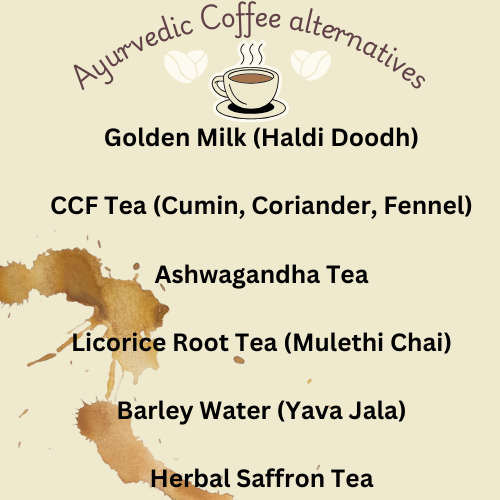Coffee has become an integral part of many morning routines, but for those seeking a healthier and more balanced option, Ayurvedic coffee alternatives offer an exciting solution. Rooted in ancient wisdom, these alternatives provide sustained energy without the side effects of caffeine. Let’s explore these options and how they align with Ayurvedic principles to enhance your overall well-being.
Why Consider Ayurvedic Coffee Alternatives?
Many people rely on coffee for energy, but its high caffeine content can cause jitters, dependency, and disrupted sleep. Ayurvedic coffee substitutes provide a more holistic approach, addressing energy needs while maintaining the balance of your doshas (Vata, Pitta, Kapha).
Top Ayurvedic Coffee Alternatives
Golden Milk (Haldi Doodh)
The combination of milk and turmeric is considered a “Rasayana” (rejuvenative) that nourishes all tissues (Dhatus) and balances Vata and Kapha. Black pepper is often added as it enhances the bioavailability of curcumin, the active compound in turmeric.
Found in Charaka Samhita and other texts, turmeric (Haldi) is hailed as a “super spice” with cleansing, anti-inflammatory, and rejuvenating properties.
Recipe:
- 1 cup milk (dairy or plant-based)
- ½ tsp turmeric powder
- A pinch of black pepper
- Optional: ½ tsp honey or jaggery
Preparation:
- Heat the milk in a saucepan.
- Add turmeric powder and black pepper, stirring well.
- Let it simmer for 2-3 minutes.
- Remove from heat and sweeten with honey or jaggery if desired.
- Serve warm.
Benefits:
- Boosts immunity
- Anti-inflammatory properties
- Promotes restful sleep
CCF Tea (Cumin, Coriander, Fennel)
Discussed in Ashtanga Hridayam as a digestive aid, CCF tea is recommended for balancing Agni (digestive fire) and maintaining doshic harmony.
This blend is a Tridoshic recipe, meaning it suits all constitutions. Cumin is known to aid digestion, coriander cools the body, and fennel soothes the digestive tract. Together, they cleanse toxins (Ama) and promote better assimilation of nutrients.
- Recipe:
- 1 tsp cumin seeds
- 1 tsp coriander seeds
- 1 tsp fennel seeds
- 2 cups water
- Optional: A slice of ginger or a dash of lemon juice
- Preparation:
- Boil water and add the seeds.
- Let it simmer for 5 minutes.
- Strain the tea into a cup.
- Add ginger or lemon juice for added benefits.
- Benefits:
- Supports digestion
- Detoxifies the body
- Balances all three doshas
3. Ashwagandha Tea
In Bhava Prakasha, Ashwagandha is celebrated as a “Rasayana,” promoting longevity and vitality.
Ashwagandha, meaning “the strength of a horse,” is an adaptogenic herb that reduces stress, boosts energy, and calms Vata dosha.
Recipe:
- 1 cup hot water or milk
- ½ tsp ashwagandha powder
- Optional: A pinch of cinnamon or cardamom
Preparation:
- Heat water or milk and stir in ashwagandha powder.
- Simmer for 2 minutes.
- Add cinnamon or cardamom if desired.
- Serve warm.
Benefits:
- Reduces stress and anxiety
- Enhances stamina
- Stabilizes energy levels
4. Licorice Root Tea (Mulethi Chai)
Mentioned in Sushruta Samhita, licorice is a remedy for Pitta disorders, soothing inflammation and supporting respiratory health.
This sweet and cooling tea pacifies Pitta dosha, enhances immunity, and aids digestion. It is often recommended for sore throats and acid reflux.
Recipe:
- 1 cup hot water
- 1 tsp dried licorice root or licorice powder
- Optional: A pinch of fennel seeds or honey
Preparation:
- Boil water and add licorice root.
- Simmer for 5 minutes.
- Strain and serve warm, sweetened with honey if desired.
Benefits:
- Soothes inflammation
- Supports respiratory health
- Balances acidity
5. Barley Water (Yava Jala)
Barley, or “Yava,” is highlighted in Charaka Samhita for its Kapha-pacifying qualities and detoxifying properties.
Is light (Laghu) and easy to digest, aiding in detoxification, urinary tract health, and weight management.
Recipe:
- 1 cup barley
- 4 cups water
- Optional: Lemon juice or honey
Preparation:
- Rinse barley thoroughly.
- Boil it in water for 20-30 minutes.
- Strain and let it cool slightly.
- Add lemon juice or honey for taste.
Benefits:
- Cleanses the urinary tract
- Regulates blood sugar
- Supports weight management
6. Herbal Saffron Tea
Saffron is praised in Charaka Samhita for its ability to improve complexion and uplift mood.
This aromatic tea is a natural mood enhancer that pacifies Vata and Pitta doshas.
Recipe:
- 1 cup hot water
- 3-4 saffron strands
- Optional: A pinch of cardamom or a teaspoon of honey
Preparation:
- Steep saffron strands in hot water for 5 minutes.
- Add cardamom or honey for flavor.
- Serve warm.
Benefits:
Improves digestion
Enhances mood
Supports skin health
Benefits of Ayurvedic Coffee Alternatives
- Sustained Energy Levels: These drinks offer consistent energy without the caffeine crash.
- Balancing Doshas: Each beverage is tailored to maintain equilibrium in the body. Learn more doshas here.
- Improved Digestion: Many options support gut health, a key principle in Ayurveda.
- Stress Reduction: Adaptogenic ingredients like Ashwagandha help manage daily stressors.
How to Choose the Right Alternative for Your Dosha
- Vata Dosha: Opt for warm and grounding drinks like Golden Milk and CCF tea.
- Pitta Dosha: Cooling herbal teas, such as Tulsi and licorice, work well.
- Kapha Dosha: Spicy and energizing options like Ginger tea or Chicory coffee are ideal.

Conclusion
Ayurvedic coffee alternatives not only energize but also support your overall well-being by balancing your doshas. In addition, these beverages offer a more sustainable energy boost compared to caffeine, allowing you to maintain a steady flow of energy throughout the day. Furthermore, they help promote digestive health and reduce stress, addressing key factors for maintaining balance in the body. As a result, incorporating these drinks into your daily routine can enhance your mental clarity, physical health, and emotional well-being. Ultimately, embracing Ayurvedic beverages is a step towards a more mindful and holistic lifestyle.
Learn more about Ayurvedic beverages by exploring the Ayush Ministry’s website.
